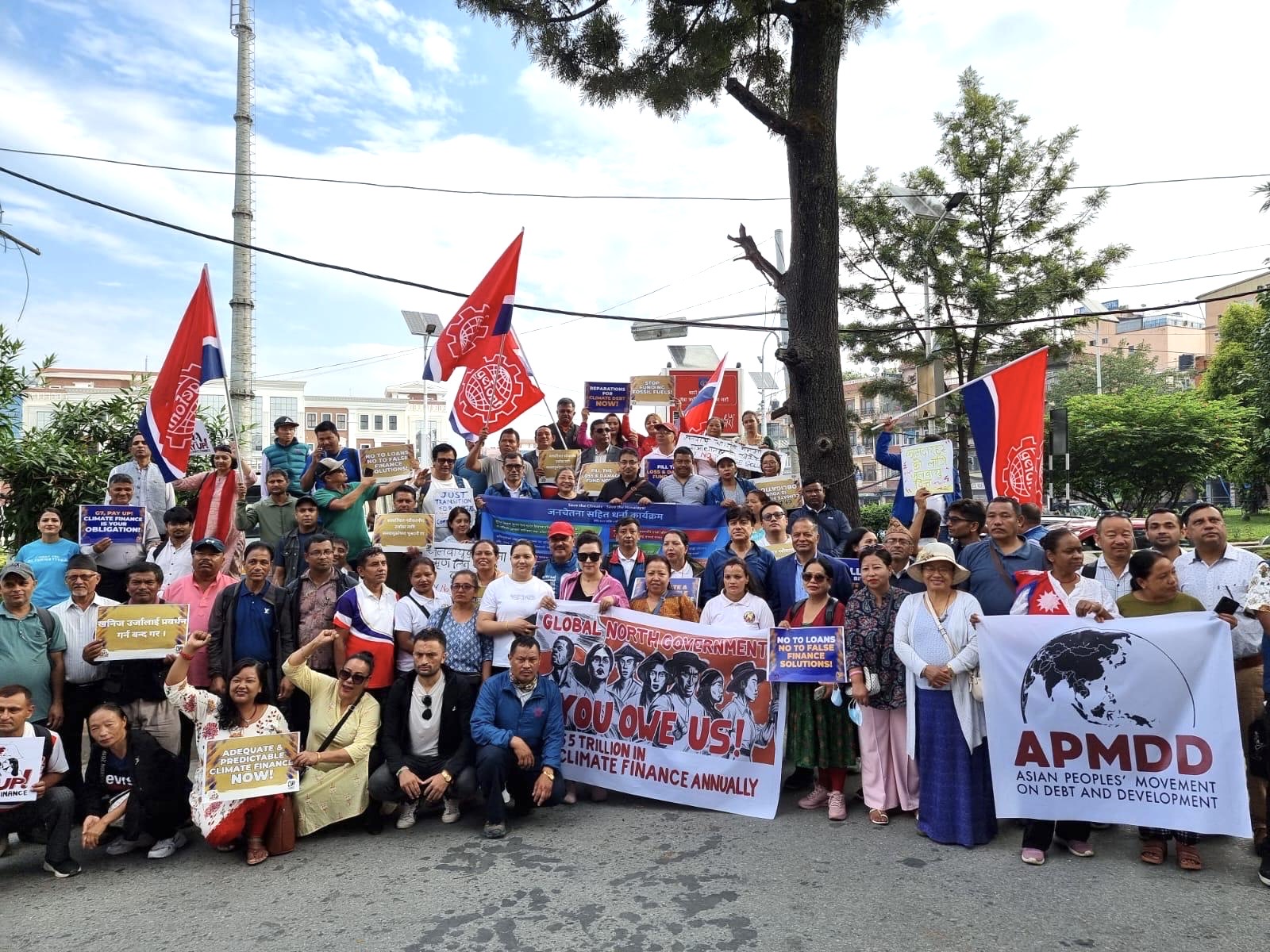Activists demand climate reparations from rich countries



Kathmandu – Climate activists have called upon rich countries to pay at least US$5 trillion as climate reparations to countries from the Global South countries.
The protest was part of a larger simultaneous protests that are being held in Pakistan, Bangladesh, Nepal, India, Indonesia, Malaysia, and the Philippines led by the Asian Peoples’ Movement on Debt and Development (APMDD) and its member organisations.
These coordinated mobilisations in Asia have been conducted ahead of the Summit of the Future and United Nations General Assembly in New York and are part of the Global Week of Action for Climate Finance and a Fossil-Free Future, a week-long event of protests in 58 countries calling for the phaseout of fossil fuels and the payment of climate finance.
“2024 has been a devastating year for those at the frontlines of the climate crisis,” says APMDD coordinator Lidy Nacpil. Extreme heat in South and Southeast Asia in the first half of the year has closed schools, disrupted food production, and collapsed power grids. In southern Pakistan, 568 people died in six days due to heat stroke.
In the second half of the year, the monsoon rains, exacerbated by climate change, have given Bangladesh its heaviest rainfall and worst flooding in over a century, leaving millions of people stranded and damaging $282 million worth of crops. In the Philippines, the Department of Agriculture disclosed that this year’s El Niño has cost 9.5 billion pesos in losses, devastating over 175,000 farmers and fisherfolk. “This year’s extreme weather events remind us that the most vulnerable people in the Global South pay the heaviest price for climate change despite contributing the least to global emissions,” Nacpil said.
“The U.S. is the leading historical emitter of planet-warming greenhouse gases, making their elites, corporations, and government primarily responsible for the climate crisis,” said Nacpil adding, “The U.S. and other rich, polluting countries have a historical, legal, and moral obligation to cover the costs of mitigation, adaptation, loss and damage, and ensuring a just transition in the Global South. If they cannot deliver an adequate amount of climate finance, injustice will prevail and people in the Global South will suffer the most as global temperatures soar.”
Under the UN Framework Convention on Climate Change (UNFCCC), developed countries agreed to provide climate finance to cover the costs of developing countries’ climate programs and projects. The target amount of climate finance that must be raised for the Global South will be a main agenda item at COP29 in November 2024. COP29 is expected to set the new collective quantified goal (NCQG) for climate finance, which will replace the previous goal of $100 billion a year, which has already been criticized as inadequate.
“For the workers of Nepal, climate change is not a distant threat, but a daily reality. It is imperative that climate finance takes into account their unique vulnerabilities, providing them with the resources to rebuild their lives and livelihoods,” said Binod Shrestha from the General Federation of Nepalese Trade Unions (GEFONT), who is coordinating the mobilisation in Kathmandu. “If the global community is serious about addressing climate change, it must prioritize the needs of vulnerable countries and workers. True climate justice means that rich nations step up, not just with words, but with resources to help countries like Nepal navigate this crisis.”, he added.
Earlier this year, U.S. treasury secretary Janet Yellen said that “no less than $3 trillion annually” would be needed to fight climate change, but implied that this amount would be heavily channeled through multilateral development banks. Recently, the Asian Development Bank announced that 50% of its annual lending would be devoted to climate finance by 2030.
Global South movements reiterate that climate finance should be paid through grants, not loans that will only increase the debt burdens of already poor countries, and delivered free of conditionalities. “Not only does it violate the principle of historical responsibility to deliver climate finance through loans, it is deeply unjust to force poor countries to go into debt to address climate change. It is not enough that the amount of climate finance is adequate–it should also be public, non-debt-creating, unconditionally delivered, and new and additional to other financial obligations of developed countries,” said Nacpil.
सम्बन्धित सामग्रीहरू
हाम्रो सिफारिस

बेलायतको पृथक नेपाली संस्था जसको प्राथमिकता छ पुस्तान्तरण, च्यारिटी र वेलबिइङ (भिडियो)
- १
- २
- ३
- ४
- ५










